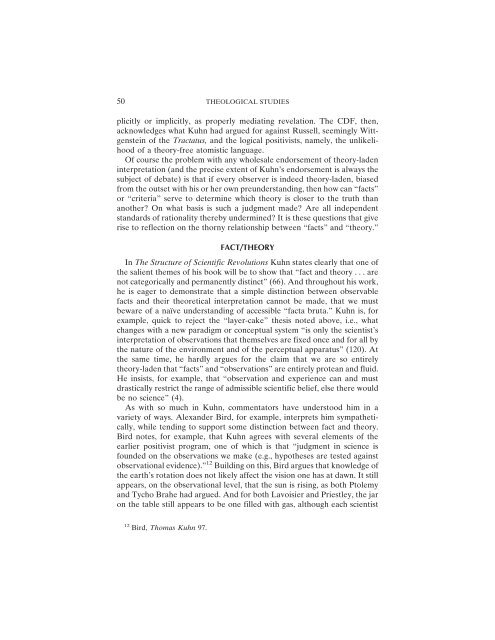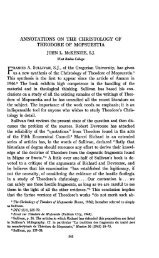rosmini, ratzinger, and kuhn - Theological Studies
rosmini, ratzinger, and kuhn - Theological Studies
rosmini, ratzinger, and kuhn - Theological Studies
You also want an ePaper? Increase the reach of your titles
YUMPU automatically turns print PDFs into web optimized ePapers that Google loves.
50 THEOLOGICAL STUDIES<br />
plicitly or implicitly, as properly mediating revelation. The CDF, then,<br />
acknowledges what Kuhn had argued for against Russell, seemingly Wittgenstein<br />
of the Tractatus, <strong>and</strong> the logical positivists, namely, the unlikelihood<br />
of a theory-free atomistic language.<br />
Of course the problem with any wholesale endorsement of theory-laden<br />
interpretation (<strong>and</strong> the precise extent of Kuhn’s endorsement is always the<br />
subject of debate) is that if every observer is indeed theory-laden, biased<br />
from the outset with his or her own preunderst<strong>and</strong>ing, then how can “facts”<br />
or “criteria” serve to determine which theory is closer to the truth than<br />
another? On what basis is such a judgment made? Are all independent<br />
st<strong>and</strong>ards of rationality thereby undermined? It is these questions that give<br />
rise to reflection on the thorny relationship between “facts” <strong>and</strong> “theory.”<br />
FACT/THEORY<br />
In The Structure of Scientific Revolutions Kuhn states clearly that one of<br />
the salient themes of his book will be to show that “fact <strong>and</strong> theory . . . are<br />
not categorically <strong>and</strong> permanently distinct” (66). And throughout his work,<br />
he is eager to demonstrate that a simple distinction between observable<br />
facts <strong>and</strong> their theoretical interpretation cannot be made, that we must<br />
beware of a naïve underst<strong>and</strong>ing of accessible “facta bruta.” Kuhn is, for<br />
example, quick to reject the “layer-cake” thesis noted above, i.e., what<br />
changes with a new paradigm or conceptual system “is only the scientist’s<br />
interpretation of observations that themselves are fixed once <strong>and</strong> for all by<br />
the nature of the environment <strong>and</strong> of the perceptual apparatus” (120). At<br />
the same time, he hardly argues for the claim that we are so entirely<br />
theory-laden that “facts” <strong>and</strong> “observations” are entirely protean <strong>and</strong> fluid.<br />
He insists, for example, that “observation <strong>and</strong> experience can <strong>and</strong> must<br />
drastically restrict the range of admissible scientific belief, else there would<br />
be no science” (4).<br />
As with so much in Kuhn, commentators have understood him in a<br />
variety of ways. Alex<strong>and</strong>er Bird, for example, interprets him sympathetically,<br />
while tending to support some distinction between fact <strong>and</strong> theory.<br />
Bird notes, for example, that Kuhn agrees with several elements of the<br />
earlier positivist program, one of which is that “judgment in science is<br />
founded on the observations we make (e.g., hypotheses are tested against<br />
observational evidence).” 12 Building on this, Bird argues that knowledge of<br />
the earth’s rotation does not likely affect the vision one has at dawn. It still<br />
appears, on the observational level, that the sun is rising, as both Ptolemy<br />
<strong>and</strong> Tycho Brahe had argued. And for both Lavoisier <strong>and</strong> Priestley, the jar<br />
on the table still appears to be one filled with gas, although each scientist<br />
12 Bird, Thomas Kuhn 97.

















